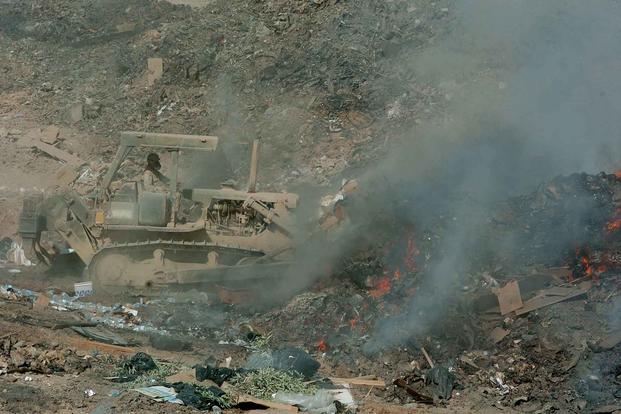A sweeping Senate compromise bill to grant benefits to millions of veterans exposed to toxins during their military service could cost $278.5 billion over a decade, according to a new estimate from the Congressional Budget Office.
The estimate tallies both guaranteed spending built into government financial systems and discretionary spending that would need to be approved each year by Congress in order to fulfill new promises to veterans contained in the bill. The Senate is expected to approve the historic bill later this week.
Republicans had balked at the price tag of a similar bill approved earlier this year by the House that the Congressional Budget Office, or CBO, estimated could cost $321.7 billion in mandatory and discretionary spending over 10 years.
Read Next: Veterans Swindled by Shuttered For-Profit Corinthian Colleges Get Loan Debt Erased
But at a news conference Tuesday morning, senators in both parties called on their colleagues to brush aside any cost concerns and pass the Senate bill, a bipartisan compromise negotiated by the leaders of the Senate Veterans Affairs Committee.
"There's absolutely no reason -- none -- that this bill should be a Republican bill or a Democrat bill," said Sen. Jerry Moran, R-Kan., the ranking member of the Senate Veterans Affairs Committee. "It should be a bill passed by the United States Senate."
Under what's being called the Sergeant First Class Heath Robinson Honoring Our PACT Act, 23 diseases would be designated as presumed to be linked to burn pits and other airborne hazards, unlocking benefits from the Department of Veterans Affairs for former service members who have struggled with those ailments for years.
The bill is named in honor of a veteran who died of lung cancer after being exposed to burn pits in Iraq. Robinson's 8-year-old daughter, Brielle, asked senators during Tuesday's press conference to "fight for the heroes who fought for our country and pass my dad's bill." She had to be lifted up to the microphone by her grandmother so the audience could see her over the lectern and hear her plea.
An estimated 3.5 million veterans have been exposed to burn pits -- massive fires used in war zones to incinerate trash ranging from plastic bottles to computers to Humvees that emanated hazardous particles in their billowing soot -- along with other airborne hazards while serving. Right now, many veterans have to prove to the VA that their disease is linked to their time in uniform, a difficult task amid skant Defense Department records, allowing the VA to deny most claims under arguments that there is not enough evidence linking the diseases to military service.
The compromise bill would, in addition to creating a presumed connection to military service for the 23 specific diseases the PACT Act covers, create a framework for connecting future ailments to toxic exposure. It would also broaden coverage for Vietnam-era veterans exposed to Agent Orange by adding Thailand, Cambodia, Laos, Guam, American Samoa and Johnston Atoll to the list of places where veterans were exposed to chemical defoliant and so are eligible for benefits.
According to the CBO, the Senate bill would increase mandatory spending, funding that doesn't require annual approval from Congress, by $667 billion over 10 years, far higher than the House bill's $208 billion increase over the same time period.
But the CBO also estimated the Senate bill could decrease discretionary spending by $388.5 billion over 10 years, in large part by reclassifying some discretionary spending as mandatory by creating a new "Cost of War Toxic Exposure Fund" to pay for some of the costs in the bill. By comparison, the House bill would increase discretionary spending by $114.2 billion over a decade.
One of the key factors driving the overall $43.2 billion difference between the Senate and House bills is that the Senate would take longer to phase in some benefits and presumptive illnesses, pushing some costs to outside the 10-year window covered in the CBO's estimate.
The longer phase-in shaved off $51 billion from the price tag, according to staffers for Moran. Some money was also saved by expanding options for veterans to seek care at non-VA facilities, the staffers said.
Meanwhile, the Senate bill would also authorize the VA to lease 31 new medical centers across the country. That added back in $11.3 billion to cost, according to the staffers.
The Senate took an initial procedural vote on the bill Tuesday, advancing it 86-12. The "no" votes came entirely from Republicans. The upper chamber is expected to pass the bill before the end of the week, after which the House will need to vote on it before it can be signed into law by President Joe Biden.
Biden, who suspects burn pits in Iraq and Kosovo caused his son Beau's fatal brain cancer, has promised to sign the bill "immediately" after it hits his desk.
-- Rebecca Kheel can be reached at rebecca.kheel@military.com. Follow her on Twitter @reporterkheel.
Related: Deal for Sweeping Toxic Exposure Bill Reached in Senate












